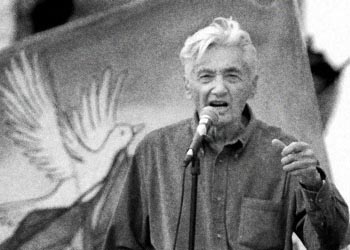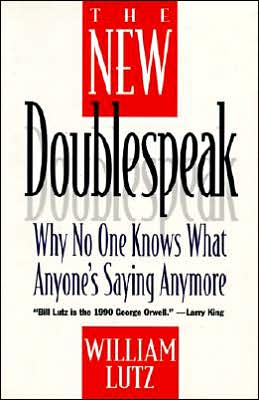Topics

Howard Zinn:
Writings on Disobedience and Democracy
Reviewed by
Donald Gutierrez
PhotoCredit: http://www.robinholland.com/
www.howardzinn.org
Howard Zinn, who died recently, was one of America's great activist historians. His famous, "A People's History of the United States," highlighted “people” because it told the story of the millions of individuals whose experience and worth seldom gets mentioned in traditional history books—the enslaved Black people, the unheralded Chinese and Irish people who built the railroads, the people who worked the mines until Black-Lung disease or mine collapses killed them, the ethnically-cleansed Native American peoples, the women and children and people of color brutalized by an America ruled by white men of property.
Now we have The Zinn Reader: Writings on Disobedience and Democracy , a 700+-page supplement to Zinn's numerous books that further accentuates his status as a superb iconoclastic historian. Reader offers a broad and varied collection of his work—essays, articles, lectures, speeches—from the 1960s nearly up to the present. The book is organized under such topics as Race, Class, War, Law, History and Means and Ends that orient the collection around many of Zinn's chief concerns. Further, each piece has a useful short introduction explaining the circumstances under which it was originally published.
One of these introductions vividly illustrates the character of Zinn's mind as an iconoclastic historian and polemicist of memorable perceptiveness and force: “I wrote this piece, which would not have found publication in the press /itals. D.G./to argue against the principle of retaliation. I am always furious at the killing of innocent people for some political cause, but I wanted to broaden the definition of terrorism to include governments, which are guilty of terrorism far more often, and on an infinitely larger scale, than a band of revolutionaries or nationalists” (“Terrorism Over Tripoli”).
That quotation offers an insight virtually never mentioned in the media and especially by governments--that governments create far more terrorism (including state torture) than “insurgents”, Mid-East terrorists, etc. It is indeed that vein of iconoclasm in Zinn's thinking that sets him apart from many historians and journalists. Zinn further empowers his observations and moral passion with a persuasive conviction that objectivity in writing history or journalism is a deception masking an ideology. All this (and more) Zinn gets across in a lucid prose as free of academic jargon as it is authentically personal—and personable; the style, as they used to say, is the man.
Zinn's thrust as a “subjective” historian is to present—he would say, select-- the Other history that traditionally gets left out of the books . We all went through school constantly hearing about the Presidents and Generals and Captains of Industry, the great industrial and technological and transportation achievements that, we were told, made America great. However, claims Zinn, “we were not told of the human cost of this great industrial progress,” and he goes on to give voice to the voiceless, the people who did the savagely hard infrastructural labor— as well as often reminding us of the many millions who continue to live in poverty and misery in the world's richest nation
Choosing the top pieces in Reader is hard because there are many fine ones. Among the outstanding in “Race” is “Abolitionists, Freedom Riders and the Tactics of Agitation; in “Class”, the heartbreaking description of “The Ludlow Massacre,” in which coal miners and their families faced the overwhelming and murderous might of unified company and government power; “Just and Unjust Wars” in “War” in which Zinn. comes to feel there are no “just” wars (partly after his reaction to being a World War II bombardier); and the lengthy, seminal essay “Law and Justice” in the “Law” section in which Zinn broaches the antithetical relation in America of law and justice. The large History section starts off appropriately with Zinn's “dark” Columbus as his example of gravely misrepresented history. The final section, “Means and Ends” climaxes in a strikingly affirmative review/essay on philosophical Anarchism based on Herbert Read's pro-Anarchist book Anarchy and Order.
Though Reader can also be profitably approached by tracing some of the major ideas in the book, space demands choosing only a few major topics, one being civil disobedience. It is crucial to Zinn's thinking that the subtitle of Reader is “democracy and disobedience.” Without disobedience, Zinn contends, America would not have had the powerful anti-slavery movements, the courageous Civil Rights and Women's Rights Movements, the defiantly individualized action of people like Daniel Ellsberg, Rosa Parks, the Berrigan brothers, Big Bill Haywood, Freedom-Bus-Rider Jim Peck and so many others less known. The problem in America, Zinn urges, is not civil disobedience: it is “civil obedience....our problem is that people are obedient while the jails are full of petty thieves, and all the while the grand thieves are running the country” (438). Without civil disobedience, Zinn argues, it is hard to possess or sustain democracy.
The issue of civil obedience versus disobedience comes down for Zinn to law versus justice. Is it wrong to break the law? Which law, he asks. “I'm not against all law,” (44) but when the law violates justice, and, for example, allows Dow Chemical's Agent Orange to be manufactured and used abroad in America's wars in Viet Nam, Iraq and elsewhere, then the principle of justice far outweighs that of law and compels civil disobedience.
Another pivotal theme in Reader is American imperialism. Time after time, Zinn reminds us that the United States has carried out ethnic cleansing (Native Americans), annexation or control of another nation's country (Mexico, the Philippines, Puerto Rico, Iraq) and has exerted enormous financial control through gunship/bayonet intervention by the Marines (Haiti, Dominican Republic, Nicaragua), and, later in the 20th century, after World War II, in military bases established globally. Moreover, American soldiers killed in Viet Nam, Iraq, Afghanistan didn't die “for their country”; they died for their government. “They will die for Bush and Cheney and Rumsfeld” (716-17). They will die, Zinn continues, for “the greed of the oil cartels, for the expansion of the American empire, for the political ambitions of the President” (717). What Zinn's reading of American imperialism suggests is that this country has a great deal of evil perpetrated abroad to account for.
Zinn's last words in Reader are warmly encouraging to activist citizenship: “You don't have to do something heroic, just something, because all of these somethings, at certain points in history, come together, and make the world better” (735).
Two inexcusable defects in this outstanding collection must be underlined—Reader contains at least twenty typos and lacks an index. Considering the wide range of allusions in this book, an index would have been invaluable.
Certainly The Zinn Reader, with its stunning compassion for the millions of innocent people murdered by American wars of “intervention”, the millions brutalized and killed by work achievement glorifying America for which they got very little pay and no credit whatsoever, and the millions whose story has seldom if ever been told, embodies a marvelous gathering of one of America's noblest historians and social polemicists. Zinn has made so-called left-radical ideas seem so humane and natural and right as arguably to move social-political discourse out of the tiresome Left-Right gamut and into another, purer sphere of moral contemplation and action; this is no minor feat.
Read more about the writer » Donald Guiterrez
Except where otherwise noted, content on this site is
licensed under a Creative Commons Attribution 3.0 License for non commerical use.




 Twitter
Twitter RSS
RSS